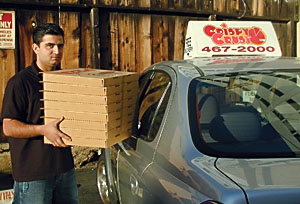Jaywalking is both illegal and dangerous -- a pedestrian is killed every 3-1/2 minutes in the U.S. -- yet many people admit to doing it frequently, a recent PEMCO Insurance poll has discovered.
What exactly is jaywalking? It occurs when a pedestrian crosses a street or highway outside of a marked crosswalk, or uses a crosswalk before the walk signal indicates it's safe to proceed. It is illegal in Washington state, and can result in a fine of between $50 and $100, depending on the circumstances.
With more than 622 pedestrians killed in traffic-related accidents in Washington in the past decade, you would think people would be more wary, but the recent PEMCO poll found that nearly one-third (31%) of Washington drivers admitted to jaywalking, despite national data that shows 20 percent of pedestrian deaths are due to illegal crossing attempts.
Even though many of the respondents admitted to jaywalking, 70 percent of drivers surveyed agree that jaywalkers should be ticketed for failure to obey the law when crossing streets or intersections.
The PEMCO poll also revealed that while 33 percent of respondents think the law favors pedestrians over drivers, a vast majority (81%) favored consequences for drivers who fail to yield for pedestrians legally crossing the street.
According to the Revised Code of Washington (RCW), vehicles must stop for pedestrians crossing roadways within both marked and unmarked crosswalks. When turning through a crosswalk, vehicles must also yield to pedestrians until they are a safe distance away. Drivers who fail to yield under those circumstances can be cited with a traffic ticket and fine, according to the law.
Drivers under 35 wanted more lenient laws against jaywalking, according to the PEMCO poll. It revealed that 43 percent of these younger drivers admitted to jaywalking at least some of the time. Predictably, about one-third of these same drivers thought jaywalkers should go unpunished if caught.
Men were more likely than women to cross illegally, 37 percent to 26 percent. The poll also found a possible correlation between jaywalking and aggressive driving. Those who often or sometimes jaywalk are more likely to speed, tailgate or fail to yield than others.
Source: PEMCO Insurance Northwest Poll, 2011




